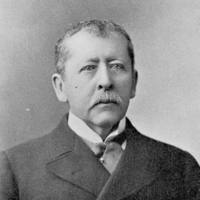
Thomas Bailey Aldrich
Thomas Bailey Aldrich (November 11, 1836– March 19, 1907) was an American literary figure notable for his long editorship of The Atlantic, during which he published works by Charles Chesnutt and for his poetry, including “The Unguarded Gates.”
Thomas Bailey Aldrich (November 11, 1836– March 19, 1907) was an American literary figure notable for his long editorship of The Atlantic, during which he published works by Charles Chesnutt and for his poetry, including “The Unguarded Gates.”
Biography
Early life and education
Thomas Bailey Aldrich was born in Portsmouth, New Hampshire on November 11, 1836. When Aldrich was a child, his father moved to New Orleans. After 10 years, Aldrich was sent back to Portsmouth to prepare for college. This period of his life is partly described in his semi-autobiographical novel The Story of a Bad Boy (1870), in which “Tom Bailey” is the juvenile hero.
Career
Aldrich abandoned college preparations after his father’s death in 1849. At age 16, he entered his uncle’s business office in New York in 1852 and became a constant contributor to the newspapers and magazines. Aldrich befriended other young poets, artists and wits of the metropolitan bohemia of the early 1860s, including Edmund Clarence Stedman, Richard Henry Stoddard, Fitz Hugh Ludlow, Bayard Taylor and Walt Whitman. From 1856 to 1859, Aldrich was on the staff of the Home Journal, then edited by Nathaniel Parker Willis. During the Civil War, he was the editor of the New York Illustrated News.
In 1865 Aldrich returned to New England, where he was editor in Boston for ten years for Ticknor and Fields—then at the height of their prestige—of the eclectic weekly Every Saturday. It was discontinued in 1875. From 1881 to 1890, Aldrich was editor of the important Atlantic Monthly. As editor, he created tension with his publisher Henry Houghton by refusing to publish commissioned articles by his friends, including Woodrow Wilson and Marion Crawford. When Houghton chastised Aldrich for turning down submissions from his friend Daniel Coit Gilman, Aldrich threatened to resign and finally did so in June 1890.
Meanwhile Aldrich continued his private writing, both in prose and verse. His talent was many-sided. He was well known for his form in poetry. His successive volumes of verse, chiefly The Ballad of Babie Bell (1856), Pampinea, and Other Poems (1861), Cloth of Gold (1874), Flower and Thorn (1876), Friar Jerome’s Beautiful Book (1881), Mercedes and Later Lyrics (1883), Wyndham Towers (1889), and the collected editions of 1865, 1882, 1897 and 1900, showed him to be a poet of lyrical skill and light touch. Critics believed him to show the influence of Robert Herrick.
Aldrich’s longer narrative or dramatic poems were not as successful. Notable work includes such lyrics as “Hesperides,” “When the Sultan Goes to Ispahan,” “Before the Rain,” “Nameless Pain,” “The Tragedy,” “Seadrift,” “Tiger Lilies,” “The One White Rose,” “Palabras Cariñosas,” “Destiny,” or the eight-line poem “Identity.”
Beginning with the collection of stories entitled Marjorie Daw and Other People (1873), Aldrich wrote works of realism and quiet humor. His novels Prudence Palfrey (1874), The Queen of Sheba (1877), and The Stillwater Tragedy (1880) had more dramatic action. The first portrayed Portsmouth with the affectionate touch shown in the shorter humorous tale, A Rivermouth Romance (1877). In An Old Town by the Sea (1893), Aldrich commemorated his birthplace again. Travel and description are the theme of From Ponkapog to Pesth (1883).
Marriage and later life
Aldrich married Lillian Woodman and had two sons. Mark Twain apparently detested Aldrich’s wife, writing in 1893: “Lord, I loathe that woman so! She is an idiot—an absolute idiot—and does not know it... and her husband, the sincerest man that walks... tied for life to this vacant hellion, this clothes-rack, this twaddling, blethering, driveling blatherskite!”
The Aldriches were close friends of Henry L. Pierce, former mayor of Boston and chocolate magnate. At his death in 1896, he willed them his estate at Canton, Massachusetts.
In 1901, Aldrich’s son Charles, married the year before, was diagnosed with tuberculosis. Aldrich built two houses, one for his son and one for him and his family, in Saranac Lake, New York, then the leading treatment center for the disease. On March 6, 1904, Charles Aldrich died of tuberculosis, age thirty-four. The family left Saranac Lake and never returned.
Aldrich died in Boston on March 19, 1907. His last words were recorded as, “In spite of it all, I am going to sleep; put out the lights.” His Life was written by Ferris Greenslet (1908).
In 1920, Aldrich’s widow Lillian Woodman Aldrich wrote her memoirs under the title Crowding Memories.
References
Wikipedia—https://en.wikipedia.org/wiki/Thomas_Bailey_Aldrich


